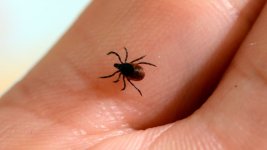David Baxter PhD
Late Founder
Kingston tests secret weapon against summer pests: garlic
CBC News
June 27, 2018
Ticks, mosquitoes, geese all repelled by spray's pungent scent

The public works department in Kingston, Ont., is testing out a garlic-based spray repellent this summer in an effort to keep ticks that carry Lyme disease at bay. (Bertrand Guay/AFP/Getty Images)
What do wood ticks and vampires have in common? Sure, they both want to suck your blood, but it turns out they also share a profound distaste for garlic.
Same goes for mosquitoes and geese.
Now Kingston, Ont., is testing out a a garlic-based spray to keep all those pests — well, maybe not the vampires — at bay.
The concoction will be sprinkled at Grass Creek Park, including an off-leash area for dogs, in the city's rural eastern outskirts to deal with the bugs.
It's also going along a portion of Centennial Drive in the city's northwest, where geese have been congregating and posing a safety hazard for motorists.
Mosquitoes and ticks have a strong sense of smell and don't like garlic, while geese despise the taste of it and won't come back to feed on grass that has been sprayed with the stuff, according to Troy Stubinski, an operations manager for the city's public works department.

Apparently Canada geese don't like the taste of garlic and won't hang out on grass that's been sprayed with it. (Danny Johnston/Associated Press)
"Geese have a very, very strong memory and in this area along Centennial there's been significant concerns for safety with geese crossing the road and our sidewalks," he told CBC Radio's Ontario Morning on Tuesday. "So geese, when they go there for their meal, they won't like the taste and they won't come back."
Depending on the weather, they might have to reapply the spray every four to five weeks and will monitor its effectiveness.
As for whether the garlic smell will bother humans, Stubinski said the spray stops smelling when it dries up after about 30 minutes.
"It's 100 per cent natural, so it's essentially 100 per cent safe," he said.
"It's something that quite simply is applied and once its application is completed and within that half-hour time period you wouldn't even know it's there."
CBC News
June 27, 2018
Ticks, mosquitoes, geese all repelled by spray's pungent scent

The public works department in Kingston, Ont., is testing out a garlic-based spray repellent this summer in an effort to keep ticks that carry Lyme disease at bay. (Bertrand Guay/AFP/Getty Images)
What do wood ticks and vampires have in common? Sure, they both want to suck your blood, but it turns out they also share a profound distaste for garlic.
Same goes for mosquitoes and geese.
Now Kingston, Ont., is testing out a a garlic-based spray to keep all those pests — well, maybe not the vampires — at bay.
The concoction will be sprinkled at Grass Creek Park, including an off-leash area for dogs, in the city's rural eastern outskirts to deal with the bugs.
It's also going along a portion of Centennial Drive in the city's northwest, where geese have been congregating and posing a safety hazard for motorists.
Mosquitoes and ticks have a strong sense of smell and don't like garlic, while geese despise the taste of it and won't come back to feed on grass that has been sprayed with the stuff, according to Troy Stubinski, an operations manager for the city's public works department.

Apparently Canada geese don't like the taste of garlic and won't hang out on grass that's been sprayed with it. (Danny Johnston/Associated Press)
"Geese have a very, very strong memory and in this area along Centennial there's been significant concerns for safety with geese crossing the road and our sidewalks," he told CBC Radio's Ontario Morning on Tuesday. "So geese, when they go there for their meal, they won't like the taste and they won't come back."
Depending on the weather, they might have to reapply the spray every four to five weeks and will monitor its effectiveness.
As for whether the garlic smell will bother humans, Stubinski said the spray stops smelling when it dries up after about 30 minutes.
"It's 100 per cent natural, so it's essentially 100 per cent safe," he said.
"It's something that quite simply is applied and once its application is completed and within that half-hour time period you wouldn't even know it's there."
